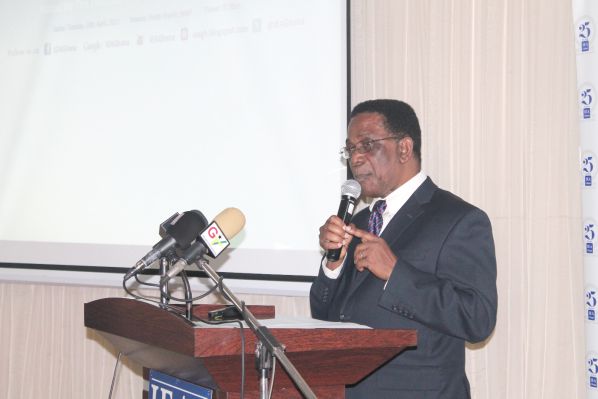
Minister unveils comprehensive plan to build capacities of tertiary institutions
The government has laid out a comprehensive plan to build the capacities of public tertiary institutions to enable them to absorb the large number of students under the free senior high school (SHS) programme who will be entering the institutions from 2020.
The Minister of State in charge of Tertiary Education, Prof. Kwesi Yankah, who made this known in Accra yesterday, said the government expected private tertiary institutions to take advantage of the large numbers to also increase their intake.
Speaking at the National Forum on Process and Funding of Tertiary Students Education through the Scholarship Scheme in Accra, Prof. Yankah said over 145,000 pioneer students of the free SHS policy would pass out in 2020.
Previously, the average number of SHS students who passed out every year was 100,000, out of which 85 per cent of those who passed their examination entered public tertiary institutions, while 15 per cent enrolled in private universities.
The minister said using the expected increases in enrolment, the government had worked out projected enrolment figures in each tertiary institution for purposes of planning.
The forum, organised by the Ghana Scholarship Secretariat, was on the theme: “Consolidating the Free SHS: Securing Alternative Funding for Tertiary Education”.
It was attended by heads of banking institutions, the top hierarchy of both private and public tertiary institutions, academicians, among others.
Preparations
Detailing the preparations that had been made by the government, Prof. Yankah said they included the expansion of university infrastructure at a cost $150 million, completion of ongoing infrastructure in tertiary institutions at $212 million and expansion of 40 colleges of education currently transitioning to become campuses of universities.
Other initiatives, he said, were the completion of the process of converting polytechnics to technical universities and retooling them and the construction and improvement of emerging universities such as the University of Health and Allied Sciences and the University of Environment and Sustainable Development.
Providing further details, Prof. Yankah said the traditional universities would absorb 58.5 per cent of the students, the technical universities and polytechnics would admit 11.48 per cent, private universities and colleges, 14.88 per cent;
public colleges of education, 10.10 per cent; private colleges of education, 1.17 per cent; specialised institutions, 2.26 per cent; public nursing training colleges, 1.43 per cent; private nursing training colleges, 0.21 per cent, and agricultural training colleges, 0.21 per cent.
Human resource
Prof. Yankah stated that the expected influx would also have implications for human resource because the expansion would create challenges for acceptable student-lecturer ratios and would require a considerable increase in faculty numbers to ensure that quality was not sacrificed for sheer student numbers.
He said the government waived the 25 per cent corporate tax on private universities to bring relief to them, help them build their human resource capacity and enable them to set up support schemes, including scholarships, for students.
The minister said President Nana Addo Dankwa Akufo-Addo believed that equitable access to higher education was a critical stepping stone to accessing tertiary education, hence the bold decision to implement the free SHS policy.
He reiterated the call on parents and guardians whose children and wards were benefitting from the free SHS policy not to be complacent but save what they would have expended on the children, so that they would use it to cater for them when they entered tertiary institutions.
Registrar
The Registrar of the Scholarship Secretariat, Mr Kingsley Agyemang, announced that President Akufo-Addo had carved a new scholarship line called local tertiary scholarship that would cater for the academic facility user fees of Ghanaian applicants in both public and private tertiary institutions.
He disclosed that an initial amount of about GH¢30 million had been earmarked for that during the next academic year, adding that to ensure that “this noble move satisfied the requirements of transparency, accessibility and all-inclusiveness, its activities will be decentralised”.
President Akufo-Addo, at the 34th National Farmers Day held in Tamale in the Northern Region last Friday, announced that the government would offer a scholarship package for the children of farmers and fishermen to pursue higher education, ranging from first degree to PhD in any agricultural subject of their choice to the tune of GH¢1,000,000.
